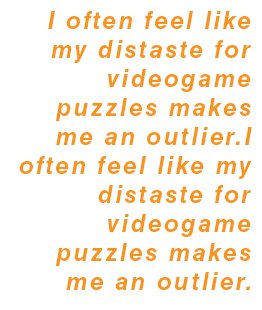I have nothing against testing my brain’s molasses-slow logic centres against a good puzzle.
but videogames almost never provide me with problems that are actually enjoyable to solve. Pretty much every time a game introduces a part where a tricky puzzle blocks progression I feel a little bit of dread: will this one be the one that makes me look up an FAQ? Will this be the one that makes me stop liking this game?
I often feel like my distaste for videogame puzzles makes me an outlier. Lots of people love them, but a glowing review written about, say, an action game that highlights its “tough puzzles” may make me think twice about whether or not it’s something I’d actually enjoy playing through. Even the best-looking adventure games give me cause for concern as well. Sometimes, it seems, it might be best to play it safe and just skip it if it advertises its puzzles — puzzles that may end up being incredibly frustrating.
I think this dislike for videogames puzzles has to do with the shape that most of them end up taking.
 The vast majority of digital brainteasers are not meant to fit within, for lack of a better term, “real world logic.” What I mean by this is that they often present a series of problems that need to be overcome using illogical solutions — the kind that only make sense within the context of a videogame. For instance, many games will trap players in a room with a locked door. Opening this door often requires the kind of puzzle-solving that has nothing to do with the sort of thought processes that a person would use in real life. A Resident Evil protagonist may be carrying a rocket launcher and an axe, but will be stopped dead in their tracks when presented with a flimsy door needing specific emblems or medals to be inserted into it in order to open. Only within the videogame itself does it make sense to spend an hour gathering obscure items and then finding the right way to use them rather than just hacking/shooting down the door.
The vast majority of digital brainteasers are not meant to fit within, for lack of a better term, “real world logic.” What I mean by this is that they often present a series of problems that need to be overcome using illogical solutions — the kind that only make sense within the context of a videogame. For instance, many games will trap players in a room with a locked door. Opening this door often requires the kind of puzzle-solving that has nothing to do with the sort of thought processes that a person would use in real life. A Resident Evil protagonist may be carrying a rocket launcher and an axe, but will be stopped dead in their tracks when presented with a flimsy door needing specific emblems or medals to be inserted into it in order to open. Only within the videogame itself does it make sense to spend an hour gathering obscure items and then finding the right way to use them rather than just hacking/shooting down the door.
Illogical puzzles like these drive me crazy. Sure, there are usually ways that you can figure them out, but they require such massive leaps in logic that they take away from the experience. Exceptions to the rule, like the two Portal games, get around the kind of problem described above by contextualizing their puzzles within the world of the game. The portal gun and test chambers in both titles are used to define the limits of what is and isn’t possible at any given moment. Once a player understands how to use the mechanics available to them, actual logic governs how any puzzle they’re presented with is solved. Simply enough, if the player can work out a solution that makes sense — not in the videogame definition of sense, but in the real world, too — it will almost always be the right choice for the puzzle they’re confronted with
On the other hand, the worst offender in the area of illogical puzzles is the genre of adventure games — a style of videogame that is usually fantastic in every other area of design (including some of the best dialogue and most imaginative visuals and plots), but absolutely awful in terms of its puzzles. As mentioned above, I’ve been burned by enough adventure games — drawn in by great aesthetics and writing only to be let down by obtuse puzzles — that the entire genre makes me a bit worried now.
But these games could be great if they decided to use real world logic in their puzzle design. L.A. Noire, for example, doesn’t adhere to the structure of the traditional adventure game and, I think, benefits tremendously because it is willing to experiment with logical “puzzle” construction. If finding the culprit in a given case is like unlocking a door, then hunting the scene of a crime for as much information as possible is like gathering keys. Interrogation and witness questioning is successful if the player has collected enough clues — and is willing to use her/his brain to work out how everything comes together. Instead of requiring “videogame logic” to progress through L.A. Noire’s take on the adventure genre, players instead need only to exercise a bit of thought to solve each of the puzzles presented by the title.
Just as Portal demonstrates how puzzle games can advance through the application of contextualization and logic, L.A. Noire shows that the framework of an adventure game can also benefit from changing how the genre’s designers implement puzzles. If more games took this kind of approach — if the future was filled with logic-based problem solving — I’d be willing to bet that I (and probably a lot of other people, too) would come to enjoy videogame puzzles and welcome, rather than dread, their implementation in all sorts of genres.
Either that or I need to start eating fish and go back to school because every time I think about this problem I get worried that I might just be . . . um . . . not very smart.
***
Reid McCarter is a writer, editor and musician living and working in Toronto. He has written for sites and magazines including Kill Screen, The Escapist and C&G Magazine. He founded, writes and edits the videogame blog digitallovechild.com and is Twitter-ready @reidmccarter.




